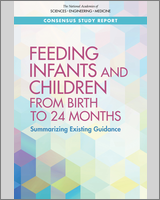From: 2, Methodology

NCBI Bookshelf. A service of the National Library of Medicine, National Institutes of Health.
| Inclusion Criteria | Exclusion Criteria |
|---|---|
|
NOTE: LEAP = Learning Early About Peanut Allergy.
Recommendations may include the primary prevention of food allergies and other common conditions (e.g., diarrhea, constipation, dental caries). However, recommendations on the treatment of a condition were excluded.
Recommendations were excluded if they were about preterm infants; clinical treatment of a specific disease or condition; clinical management of lactation; the benefits of breastfeeding; methods for preparing and storing foods, including breast milk and formula; malnutrition or emergency situations; intake of breastfeeding mothers; or infant formula composition.
Many agencies, organizations, and groups used the LEAP trial (Du Toit et al., 2015) to update feeding guidelines related to the primary prevention of peanut allergy. Inclusion of peanut allergy–related recommendations predating the release of the LEAP trial results would unnecessarily introduce inconsistency and those earlier recommendations were therefore excluded.
From: 2, Methodology

NCBI Bookshelf. A service of the National Library of Medicine, National Institutes of Health.